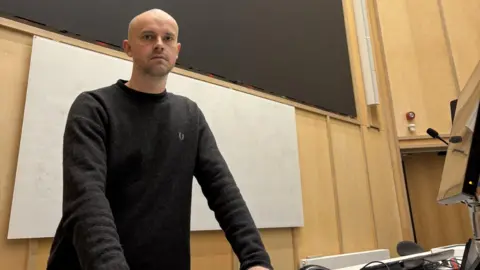[ad_1]
Hayley Clarke
Education reporter
 Darcie James
Darcie James
Darcie James says her course, which included a 12 months overseas in France and Spain, made her ‘rather more assured’
Universities throughout the UK are battling their funds.
From job cuts to course closures, many are actually having to make robust choices.
Most universities will nonetheless be dealing with monetary struggles subsequent 12 months, even with tuition charges in England and Wales rising from ÂŁ9,250 to ÂŁ9,535, after years of stagnation.
Before that, charges had solely elevated by ÂŁ250 since 2012, after they tripled to ÂŁ9,000.
Costs, together with workers salaries and constructing works, have continued to rise in that point – that means budgets have been getting tighter and tighter.
And the problems aren’t simply restricted to England and Wales. Queen’s University Belfast has confronted criticism this week over its determination to open a campus in India whereas planning to chop as much as 270 jobs.
The authorities says it’s “committed to fixing the foundations of higher education”, whereas Universities UK, which represents 141 universities, says the sector has been “doing more with less for years”.
‘Anger and uncertainty’
 Andy Williams
Andy Williams
UCU department president Joey Whitfield says points can not maintain taking place if the UK desires to retain its place as a world chief in greater training
For Cardiff University final-year languages pupil Darcie James, 23, the headlines hit near dwelling after her college final month introduced plans to chop 400 jobs and shut some programs.
Her school, which she says “feels like a little family”, is now vulnerable to closure. Nursing and music programs are additionally below menace.
The University and College Union (UCU) department says it’s going to have a no-confidence vote within the management crew on the college over the plans.
Branch president Joey Whitfield, senior lecturer in Hispanic research, says there may be “a lot of anger and uncertainty”, and that some college students have reported workers crying to them throughout lectures.
The college’s vice-chancellor, Prof Wendy Larner, says the college’s closing plans “will be shaped by our community” in a 90-day session.
“The scale of the challenge will remain, but the way that we address it will certainly be refined and developed over the next 90 days,” she says.
Student Darcie says she was “really shocked” by the bulletins, and that, as somebody who has lived with anxiousness, her course – particularly her 12 months overseas in France and Spain – has “made her as a person”.
She says it’s “so important others have that available too”.
‘It feels such as you’re operating right into a wall’
 Huba Papp
Huba Papp
Brendan Papp says being busy with volleyball and the scholar newspaper retains him going
In January, the University of Kent stated extra jobs could be reduce in a bid to avoid wasting almost ÂŁ20m.
Last February, the college introduced proposals to chop 58 jobs and “phase out” six topics – artwork historical past, anthropology, well being and social care, music and audio know-how, journalism, and philosophy and spiritual research – in response to its “financial challenges”.
Third-year journalism pupil Brendan Papp, 21, is being “taught out” – that means college students presently on the cancelled course are seeing it by till completion.
When he utilized, he says the course ranked within the prime 5 within the nation. Now, he says, it is fallen to “dead last”.
An worldwide pupil from Virginia within the US, Brendan got here to the UK to chase his dream of changing into a sports activities reporter. Now, he is eager to finish his course so he can transfer to Madrid to do sports activities administration as an alternative.
He says the category misplaced “two really good teachers because of the cuts”.
Now he says “it feels like you’re running into a wall” and, with engagement within the course dipping, he is struggling to see the outcomes from his laborious work.
Brendan says the workers have been “excellent”, although, attempting to supply an expertise that is “as good as possible”.
One workers member from a special division, who requested to not be named, says they imagine the earlier cuts have had a knock-on impact on pupil recruitment, resulting in additional cost-saving measures and damaging workers morale.
A college spokesperson says that sentiment will not be mirrored in its workers surveys.
They say “sector finances are under severe pressure and, like many other institutions, we have been making wide-ranging changes” to be able to “reflect what students and government are looking for from universities”.
‘Everything is taking a success’
 Nathan Wyatt
Nathan Wyatt
Nathan Wyatt is frightened there could possibly be a ‘mind drain’ of UK college students opting to go overseas to review
Staff on the University of East Anglia (UEA) have introduced plans to strike this week over the college’s proposed cuts to 170 full-time positions.
UEA says these “incredibly challenging decisions” – made in an effort to avoid wasting ÂŁ11m – weren’t taken evenly.
Nathan Wyatt, 23, the scholar union’s welfare officer and a former politics pupil, says he led the cost towards earlier cuts in 2023.
He says there’s a feeling of “fatigue” about dealing with extra cuts.
“The consensus on campus is that people are feeling drained, and they don’t have the energy to go out and say ‘no cuts’ as loudly as they did before.”
 Nadine Zubair
Nadine Zubair
Nadine Zubair says it seems like ‘an infinite cycle of cuts’
Nadine Zubair, a digital humanities supervisor and co-chair of the college’s UCU department, says college students and workers are affected by the cuts “in every aspect of their experience here: their morale, their workloads – everything is taking a hit”.
“We are a world-leading sector, but the world is watching us crumble under our own managerial panic or desperation.”
A college spokesperson says UEA continues to be dedicated to “high-quality student education and experience, and we will work hard to limit any impact on students”.
They say “compulsory redundancies will always be a last resort”.
‘It’s making me rethink a Masters’
 Luca Hughes Joshi
Luca Hughes Joshi
Lily says she does not need college cuts to cease her attaining what she desires to
Durham University says it desires to avoid wasting ÂŁ10m in workers prices by reducing about 200 skilled companies roles this 12 months.
Further financial savings might embrace cuts to educational workers subsequent 12 months, it says.
Professional companies workers assist the operating of the college, whereas lecturers are liable for analysis and instructing.
“Strenuous efforts” can be made to make sure these are voluntary redundancies, says Durham, including that it “remains a world-leading university”.
Student Lily Gershon, 22, co-editor-in-chief of the scholar newspaper, says the cuts are making her rethink whether or not she desires to go on to do a postgraduate course at Durham.
She says the skilled companies workers who’re dealing with cuts this 12 months make up the “backbone” of the college.
Lily, from Hong Kong, says her mum “sacrifices” to pay for her to go to school as she will not be entitled to a pupil mortgage and lives on about ÂŁ50 per week.
But she says being the cohort whose exams have been cancelled as a consequence of Covid means “we’re quite a resilient bunch, so we know we can adapt”.
 Dr Katie Muth
Dr Katie Muth
Katie Muth says the nationwide funding mannequin for universities is ‘damaged’
Katie Muth, assistant professor in digital humanities and trendy literature – and a member of Durham’s UCU Committee – says colleagues are “pretty worried across the board” by the college’s bulletins.
She says “there’s a lot of anxiety” and colleagues are involved about their workloads rising as folks depart.
“People are already working at or above capacity,” she says.
She believes “band-aid” options aren’t going to repair a better training sector in want of systemic modifications.
A college spokesperson says all departments are being requested to search out financial savings, and the college is partaking with workers “in an open and transparent way”.
They say any voluntary workers departure “would be considered in relation to the likely workload impact and opportunities to reduce workload”.
How did we get right here?
After the freeze on charges, universities say funds have been getting tighter for years.
Then there was the shock of latest visa restrictions on worldwide postgraduates coming to the UK bringing their companions and youngsters.
International college students pay greater charges, however the introduction of these restrictions in January 2024 has led to a drop of round 16% in functions.
That, in flip, has led to extra competitors between universities to safe locations for UK college students.
The physique which regulates greater training, the Office for Students (OfS), has warned that with out change on a scale not seen earlier than, 72% of universities might slide into monetary deficit – the place a college spends greater than it’s bringing in – by 2026.
“We have called for universities and colleges to take bold, transformative steps to address the challenges, and we know that many are taking action already,” an OfS spokesperson stated.
It can be almost not possible to inform if a college will go bust.
That is as a result of universities borrow cash from banks primarily based on the worth of the property they personal, like buildings and land. If they get into monetary bother, they are going to renegotiate the phrases of their mortgage with the financial institution – and no financial institution desires to see a college which owes them cash failing financially.
The Department for Education says the federal government inherited a “dire economic situation” and has taken “tough decisions to bolster universities’ financial sustainability”.
“The Office for Students is rightly refocusing its efforts on monitoring financial sustainability, to help create a secure future for our world-leading sector,” a spokesperson stated.
“Whilst institutions are autonomous, we are committed to fixing the foundations of higher education to deliver change for students.”
Additional reporting by training editor Branwen Jeffreys
[ad_2]



